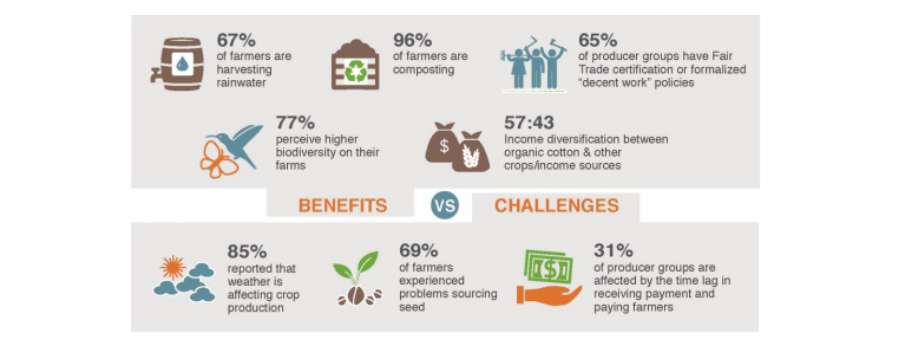Sustainability
Textile Exchange builds on success with organic cotton sustainability assessment

Encouraged by the momentum of the Life Cycle Assessment, Textile Exchange continued to research organic cotton’s broader range of impacts beyond the LCA’s environmental focus. TE worked with producers, TE members and field partners in fourteen countries to collect data for the study. The Organic Cotton Sustainability Assessment Tool provides a holistic assessment of organic cotton’s impact on economic and social aspects, as well as environmental. The program was made possible by sponsorship from both Eileen Fisher and ICCO, the interchurch cooperative for development cooperation.
”The OC-SAT is an elegantly designed, user-friendly tool that seamlessly organizes and makes assessable a global treasure trove of up-to-date data on organic cotton. It's like having a room-full of organic cotton experts at your fingertips. Loomstate can't wait to integrate and utilize this tool for our future sourcing, marketing, and communications,” said Scott Hahn, Co-Founder, Loomstate.
The framework for the OC-SAT was developed in line with the work of the Committee on Sustainability Assessment (COSA) and the Food and Agriculture Organization (FAO) of the United Nations as well as other organizations that have spearheaded this new science of broader sustainability assessment.
“It is only with assessment tools that are simultaneously very practical and science-based that we can sufficiently understand the social, economic, and environmental impacts of cotton production. If we are committed to improving the overall strategies of sustainability then such an investment is necessary in order to better manage spending, engage all stakeholders, and optimize good practices to attain the outcomes that we collectively seek”. Daniele Giovannucci, President & Co-Founder of the Committee on Sustainability Assessment (COSA).
Textile Exchange has released a “Phase 1” report that covers the key findings of the OC-SAT with data from eight countries (Benin, Burkina Faso, China, India, Mali, Senegal, Tanzania, and Turkey). TE will complete the picture in 2015 as Phase Two will explore the remaining organic cotton producing regions including Latin America, the United States, Egypt and Central Asia.
“I have been an organic cotton famer for more than 25 years and I’ve seen many positive impacts of what we do - using water wisely, increased bio-diversity and building life in the soil and community. We are most successful when we work together to harness the power of collective knowledge. I’m delighted to see that coming through so clearly in this Sustainability Assessment Tool,” said La Rhea Pepper, Managing Director for Textile Exchange.
